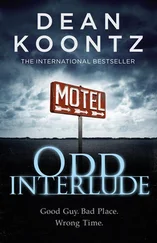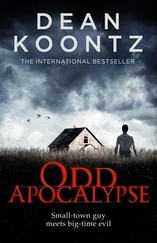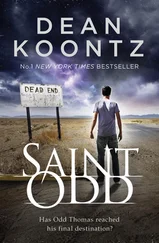As Utgard readied the polygraph and the chief went around to the other side of the table, I said, “What do you think of Sinatra?”
“Think of what?” the chief asked.
Getting to my feet, I said, “Sinatra, the singer.”
The tone of Utgard’s bearish voice suggested that he did not like me, did not trust me, and did not want me in their game, no matter how much top-secret intelligence from Homeland Security I might be able to share with them: “What the hell do you care what we think?”
“Sinatra,” the chief said dismissively. “Who listens to that crap anymore?”
The Voice, voiceless since death, pivoted toward Shackett.
“I had this girlfriend,” I said, “she swooned for Sinatra, but I say he was just a gutless punk.”
“They’re all punks,” the chief said. “Fact is, they’re all pansies.”
“You think so?” I asked.
“Sure. The big rock stars, the heavy-metal idiots, the lounge lizards like Sinatra, they all act tough, want you to believe they’re true wise guys who made their bones, but they’re all light in the loafers.”
Here was contempt, bigotry, and insult served up steaming on a platter, and I was so grateful to the chief that I almost cried.
“In World War Two,” I told Shackett, “Sinatra dodged the draft.”
Mr. Sinatra snapped his head toward me so fast that had he been alive, he would have broken his neck. He knew that I knew this was a lie, which made my attack on his character especially unfair. His face contorted so extremely that it conveyed both astonishment and rage at the same time.
“Of course he dodged,” the chief said. “What would he have done if he’d come up against Nazi badasses-slap them with his perfumed handkerchief?”
Concentric rings of power, visible only to me, began to radiate from Mr. Sinatra’s fists.
“So,” I said to Hoss Shackett as, in blissful ignorance of the building storm, he settled on his chair, “then you think maybe he and Dean Martin were more than just friends?”
Utgard Rolf stepped around the polygraph, scowling. “What’re you going on about?”
In the corner, the third chair began to rock slowly side to side as the pulses of power from Mr. Sinatra disturbed it.
“I’m just saying he was a gutless punk,” I replied, wishing I could think of a new insult.
“Anyway,” the chief volunteered, “that old music-Rod Stewart sings it better.”
“That should just about do it,” I said.
Utgard’s yellow eyes were not half as scary as Mr. Sinatra’s blues had become. Looming over me, he said, “Why don’t you shut up?”
“Why? Are you a big Rod Stewart fan or something?”
He was such a solid package of bone and beef that most punches he took probably resulted in shattered hands for those who threw them.
With the menace of a grizzly suffering a toothache, he growled, “Sit down.”
“Hey, pal, take it easy, okay? We want the same thing. Don’t you want this stinking country nuked to its knees?”
Perhaps one of Grandma Melvina Belmont Singleton’s gorillas had been an ancestor of Utgard’s, because the big man’s instincts were closer to the jungle than were the chief’s. He knew something about me was wrong, and he acted on it.
Utgard backhanded me across the face so quick I hardly saw his arm move, and so hard that gorillas in Africa would be looking up in surprise from their bananas when the crack of the blow reached them at the speed of sound.
I thought I had taken the hit without losing my footing, but when I tried to run, I discovered that I was sprawled on the floor.
Licking my lips, tasting blood, I shouted inspiration to Mr. Sinatra: “God bless America!”
Denied the chance to fight for his country in World War II, Old Crazy-Whirling-Blue Eyes seized this opportunity. He went ballistic.
He opened his fists and held his arms out straight, palms bared, fingers spread. Pulses of power, pale-blue rings, flew from him and animated the inanimate.
In the corner, the third chair started spinning on one leg, striking from the concrete a shriek as shrill as a drill bit might have made.
Instead of decorating my face with repeated impressions of his shoe tread, Utgard turned toward the whirling chair.
Chief Hoss Shackett, about to face the consequences of comparing Rod Stewart and Mr. Sinatra to the latter’s disadvantage, rose from his chair in astonishment.
As a first strategic step toward the door, toward freedom, toward the hope of living to eat another bacon cheeseburger, I crawled under the table with the expectation that it would provide a temporary shelter while I calculated my next move.
The whirling chair exploded to the ceiling, ricocheted off the concrete, and bounced off the table with a boom! that made me feel as if I had taken refuge inside a drum.
A greater clatter arose, and I figured all three chairs must now be whacking around the room, a disturbing amount of crazed furniture in such a small space.
Hoss Shackett cursed, and Utgard topped him in the potty-mouth competition, and the chief followed his expletive with a grunt of pain that suggested justice was sometimes done in this world, after all.
As the metal table began to levitate off the floor, I scuttled on my hands and knees between its turning legs, which an instant later began to revolve so fast that they cut the air with a whirring worthy of a descending plague of locusts.
I abandoned my half-formed plan to reach the door in cautious stages, and I crawled as fast as a cockroach, eager to escape before the heavy table and the heavier wheeled polygraph began to carom from wall to wall with lethal enthusiasm.
Behind me, the chief spat out several astonishing words strung together in an order that was too imaginative for me to recall with accuracy, and Utgard Rolf shouted a bizarre knot of syllables that I had never heard before, though I knew at once that this, too, was not very suitable for print. I heard less anger than terror in their cursing.
As I reached the door, something slammed into the plastic panel that covered the ceiling fixture. The panel cracked, and the slamming something slammed again. Light bulbs shattered, and the interrogation room went dark.
Clawing up the slab of steel, I found the handle, levered it down, and pushed on the door. Ball-bearing hinges carried the great weight with ease, and I opened the door only wide enough to slip into the basement hallway.
I had some sympathy for Hoss and Utgard, although not nearly enough to hold the door open for them. In fact, I leaned against that steel barrier to shut it quickly, closing them in the perilous dark. I would have locked it, too, except that it locked from the outside only with a key.
In spite of the care the chief had taken to isolate noise within the room, the fusillade of furniture grew thunderous, especially when a chair or the table struck the steel door. I could hear the two men shouting, as well, because neither of them had a gag in his mouth and duct tape across his lips, as I would have had after failing the lie-detector test.
The basement hallway with the interestingly stained concrete floor was not a place I wanted to be discovered by whoever responded to the racket in the interrogation room. I hurried toward the stairs, down which the two young officers had earlier conducted me.
AS I REACHED THE STAIRS THAT LED UP FROM the basement of the police station, the muffled clatter-clang from the interrogation room erupted into a full-fledged cacophony as the steel door came open.
Glancing back, I saw neither Hoss Shackett nor Utgard Rolf. Mr. Sinatra did not appear, either.
Through the open door and into the hall came a collection of badly abused public property for which the police department should have to answer to taxpayers when submitting its next budget request: a mangled metal chair, bent and twisted parts of other chairs, shards of frosted plastic, a once sturdy metal table now folded in half like a slice of bread…
Читать дальше
Конец ознакомительного отрывка
Купить книгу


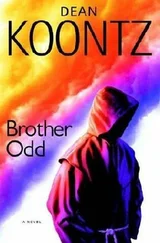
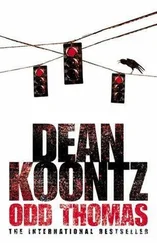



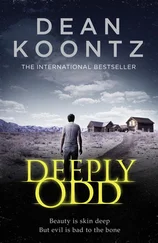
![Dean Koontz - You Are Destined To Be Together Forever [an Odd Thomas short story]](/books/705298/dean-koontz-you-are-destined-to-be-together-foreve-thumb.webp)

